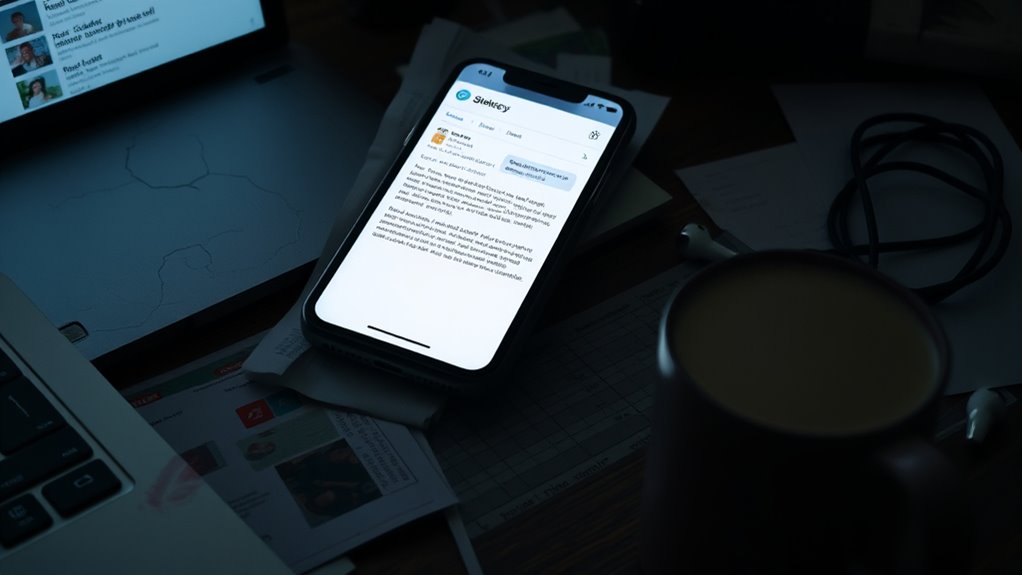If you notice sudden privacy changes like tighter social media controls, it could be a sign your partner’s hiding something. Suspicious contacts, secretive messages, or deleting chats may also point to secret communication. Unusual online activity, such as late-night device use or frequent password changes, suggests concealment. Cookies and digital tracking can reveal patterns of hidden browsing or interactions. Spotting these clues might help you understand what’s really happening, and the more you uncover, the clearer the picture becomes.
Key Takeaways
- Sudden privacy setting changes, like restricting profile visibility or limiting comments, may indicate secretive online behavior.
- Adding unfamiliar contacts with minimal profile info or evasive responses can be a red flag.
- Hiding messages, deleting chat history, or using disappearing messages suggests concealment of interactions.
- Unusual device activity times or increased protectiveness over phones hint at secret online communication.
- Cookies and digital footprints can reveal hidden browsing patterns or access to concealed websites.

Have you ever wondered if your partner is hiding something? In today’s digital age, a lot of what someone does online can reveal hidden truths. One of the first signs to look out for involves their privacy settings. If your partner suddenly tightens their social media privacy, it could be a sign they’re trying to conceal something. They might restrict who can see their posts, limit who can comment, or even change their profile visibility to “friends only” or “private.” These are subtle shifts that can indicate they’re hiding certain interactions or contacts. It’s not always suspicious on its own, but when combined with other behaviors, it warrants a closer look.
Another red flag involves suspicious contacts. If your partner begins adding or accepting connections from people you don’t recognize, especially those with flirtatious or ambiguous profiles, it’s worth paying attention. Do they have new contacts with little profile information or recent activity? Are they engaging in private conversations with these contacts, perhaps through direct messages or encrypted apps? These interactions can be innocent, but they can also be a sign of something more. If your partner is increasingly secretive about their contacts or seems evasive when you ask about them, it’s a sign to investigate further.
Suspicious contacts with little info or recent activity may indicate hidden interactions or untrustworthy behavior.
You might notice that they’re constantly adjusting their privacy settings to keep certain conversations hidden from you. For example, they could be hiding messages, photos, or even entire conversations with suspicious contacts. Some may even use features like “disappearing messages” or delete chats regularly, making it harder for you to see what’s happening. These steps are often taken to conceal infidelity or inappropriate behavior. When you observe these digital footprints, it’s essential to think about the context and whether they’re consistent with their usual online behavior.
Additionally, pay attention to their online activity patterns. Are they spending more time on their devices late at night or during times they previously wouldn’t? Are they suddenly more protective of their phone or computer, changing passwords or refusing to let you see their screen? These behaviors, combined with suspicious contacts and tightened privacy settings, can point to a pattern of hiding something. While none of these signs alone confirm infidelity, together they build a case that warrants honest communication. Trust your instincts, but also approach the situation with sensitivity and a desire to understand what’s really going on behind the screens.
It’s also helpful to consider the role of Cookies in tracking online behavior, as they can sometimes reveal patterns or access information that your partner might be trying to hide.
Frequently Asked Questions
How Can I Confirm Digital Suspicions Without Invading Privacy?
You can confirm digital suspicions by focusing on privacy concerns and trust-building strategies. Talk openly with your partner without invading their privacy; express your feelings honestly and ask about their digital habits. Pay attention to their responses and behaviors, rather than snooping. Building trust through clear communication helps you understand each other better, reducing suspicion and fostering a healthier relationship based on mutual respect and honesty.
Are Secretive Social Media Habits Always a Sign of Cheating?
Secretive social media habits aren’t always a sign of cheating, but they can raise privacy concerns. Instead of jumping to conclusions, focus on trust building by having honest conversations about boundaries and expectations. Pay attention to patterns and how your partner responds to your concerns. Remember, respect for privacy is key, and open communication often helps clear up doubts without invading their space or damaging trust.
What if My Partner Denies Any Suspicious Online Activity?
If your partner denies suspicious online activity, consider whether their privacy boundaries are respecting your concerns or hiding something. Trust rebuilding takes time, so avoid jumping to conclusions. Instead, have an open, honest conversation about your feelings and boundaries. Remember, transparency fosters trust. If doubts persist despite their denial, it might be helpful to seek couples counseling or reflect on what’s best for your emotional well-being.
Can Digital Clues Be Misleading or False Indicators?
Digital clues can definitely be misleading or false indicators. You might interpret a digital misinterpretation as cheating, but it could be innocent, like a forgotten message or a misunderstood notification. False digital cues often stem from misunderstandings or technical glitches. Always consider context before jumping to conclusions, and avoid relying solely on digital clues. Open, honest communication is key to clarifying any doubts and preventing false digital cues from damaging your relationship.
How Should I Approach My Partner About Digital Red Flags?
Like steering through a minefield, approaching your partner about digital red flags requires care. Start by expressing your feelings honestly, emphasizing trust issues rather than accusations. Use “I” statements, such as “I feel uncertain about our digital boundaries,” to keep the conversation open. Remember, open dialogue fosters understanding. Approach with empathy, not blame, and listen. This way, you build trust rather than damage it, strengthening your relationship’s foundation.
Conclusion
So, next time your partner suddenly becomes overly secretive with their phone or deletes messages with a flourish, remember—those digital clues might just be the universe’s way of telling you to double-check. Ironically, in a world obsessed with transparency, it’s often the hidden apps and vanished texts that reveal the truth. Trust your instincts, but don’t forget: sometimes the biggest red flags are hiding in plain sight, just waiting for you to notice.









